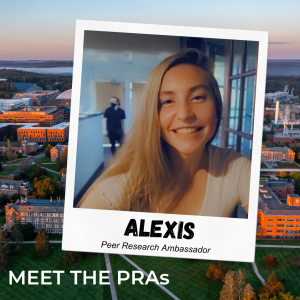Meet Alexis Elkinson ’25, an OUR Peer Research Ambassador majoring in Physiology & Neurobiology.
 What is the focus of your research?
What is the focus of your research?
During my sophomore year, I began working as an undergraduate research assistant in Dr. Guillermo Risatti’s Connecticut Veterinary Medical Diagnostic Laboratory. Collaborating with the Engineering Department, I took on a leading role in researching the relationship between fabric components and bacterial resistance. This project involved cultivating various bacteria strains and testing their interactions with specific fabric materials, ultimately contributing to the development of more effective and advanced antimicrobial procedure masks and air filters.
I also began pursuing my interests further by embarking on an independent study working under Dr. Risatti focusing on the genetic characterization of microbes through next-generation sequencing, particularly of COVID-19 variants and rabies viruses. This research forms the basis of my honors thesis.
Why did you get involved in research?
I pursued involvement in research to engage in a creative activity beyond the scope of my major. While I am deeply interested in the processes of physiology and neurobiology, I sought to challenge myself with a different field, which is why I aimed to join a pathology lab. By exposing myself to novel procedures and operations, I believe I can become a more well-rounded student and future physician.
What advice would you give to aspiring student researchers?
I firmly believe in the importance of clearly defining your research questions. It is crucial to determine precisely what you aim to achieve and why you are pursuing the specific research endeavors you are about to undertake. Before commencing as a student researcher, it is essential to address these questions thoroughly. Additionally, it is advisable to engage in multiple informational meetings with professors and consider working in different labs to gain a comprehensive understanding of your interests. It is equally important to recognize that continuing under a professor or mentor should align with your passion and research goals. If it does not, it is acceptable to seek other opportunities that better serve your interests.
What do you enjoy the most about participating in research?
I particularly value the autonomy involved in research. Once you become well-versed in your interests and the specific focus of your investigation, the sense of independence is remarkable, especially since such freedom is not commonly experienced by students during their undergraduate studies or classes.
What are your plans after graduation? How has involvement in research influenced your plans and prepared you for the future?
After finishing my undergraduate studies, I plan to enter medical school with the goal of specializing in surgery or emergency medicine. I intend to use the analytical skills I’ve honed through research to inspire and educate others in the medical field. Given my strong belief in the importance of research, I hope to continue pursuing it throughout my medical career. This ongoing involvement will help me deliver better patient care, develop new treatments, refine my critical thinking abilities, and improve overall patient well-being.
Click here for more information on Alexis and other OUR Peer Research Ambassadors.